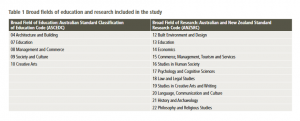
Lecture : What is humanities? How does it contrast with: science? social science? creative arts? How has the structure of universities (and other social institutions influenced our understanding of these questions? [slides]
Readings:
Bod, Rens. 2014. A new history of the humanities: the search for principles and patterns from antiquity to the present. Oxford: Oxford University Press. (Chapter 1: Introduction) [available from library as an ebook) [pdf]
Collini, Stefan. 2015. Seeing a Specialist: the Humanities as Academic Disciplines. Past & Present 229(1). 271–281. doi:10.1093/pastj/gtv029. [pdf]
Just for fun, humanities in the Google n-gram viewer.
Tutorial:
Web Skills
Referencing online
Activity 1:
Below is a list from a report on Humanities, Arts and Social Sciences in Australia. The fields of study are broad here, but which ones would you assign to each category?

From: Turner, Graeme, Kylie Brass, Australia, Department of Industry, Australia, Office of the Chief Scientist, Academy of the Social Sciences in Australia & Australian Academy of the Humanities. 2014. Mapping the humanities, arts and social sciences in Australia. (p6)
Activity 2:
Here is a very typical humanities question:
Today, it is only with verb roots ending in [t] or [d] that the past tense suffix adds a syllable in English; compare waked and waited. In the early C17, the situation was fluid – the suffix could be a syllable with any root, but it did not have to be. Some writers (poets) are quite meticulous about making a distinction between wak’d and waked, but printers were often careless. In relation to some lines by Ben Jonson, a scholar writes:
“Ben Jonson also expressed a strong view on rhyme:
XXIX A Fit of Rhyme against Rhyme…
Greek was free from rhyme’s infection,
Happy Greek, by this protection,
Was not spoiled,
Whilst the Latin, queen of tongues,
Is not yet free from rhyme’s wrongs,
But rests foiled.
…
He combined these leaden rhymes with a faltering metre, created by inserting the three syllable line every three lines, often enjambed with the preceding couplets, that interrupts the rhythmic flow they establish and has the effect of a graceless stumble.”
In light of what we have said above, is this a reasonable comment (especially claiming three syllable lines)? How might you go about deciding this question?
Full text (search page for Fit of Rhime)
Header image: Scholar with his books. By Gerbrand van den Eeckhout – Transferred from en.wikipedia to Commons by Bulwersator using CommonsHelper.Original uploader was DO’Neil at en.wikipedia, 3 June 2004 (original upload date), Public Domain, https://commons.wikimedia.org/w/index.php?curid=17731738